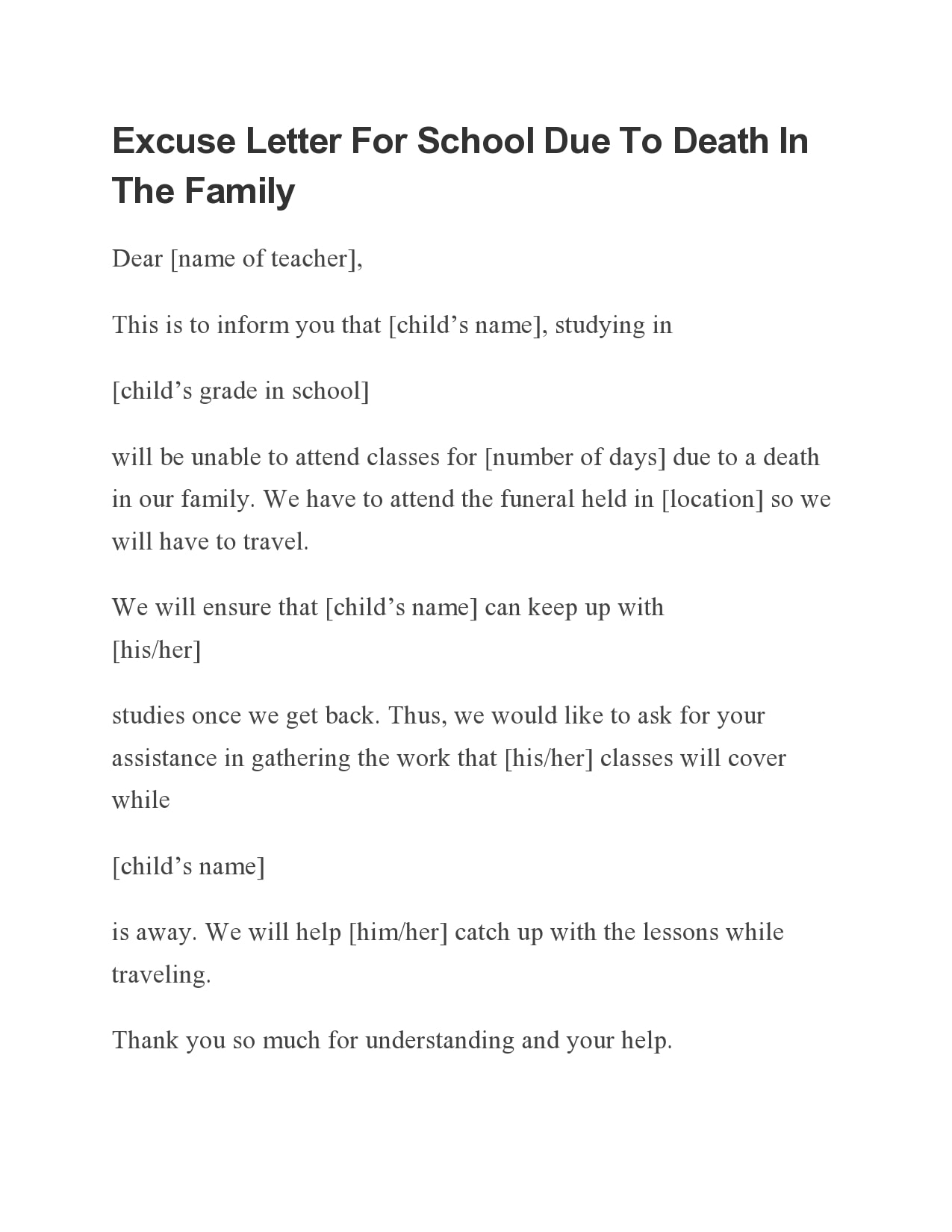Have you ever been in a situation where you needed to attend a funeral, but work obligations seemed to stand in your way? It’s a delicate dance, trying to balance the need to be present for a loved one’s passing while fulfilling professional responsibilities. Seeking an excuse letter for attending a funeral might feel awkward, but it’s a valid approach to handle such a sensitive situation with grace. This article delves into the intricacies of crafting a fitting death excuse letter, providing guidance and insights to navigate this challenging experience.
Image: blogsbots.blogspot.com
The death of a loved one is a deeply personal and emotional experience. The need to attend their funeral is a natural and profoundly important act of remembrance and support for the grieving family. Navigating the complexities of work and grief often requires a delicate balance, and a well-crafted excuse letter can contribute to that balance. It can offer a respectful and dignified way to explain your absence while acknowledging the solemn nature of the situation.
Understanding the Importance of a Funeral Excuse Letter
Before we delve into the specifics of crafting a death excuse letter, it’s crucial to understand the significance of such a request. A death excuse letter is a formal way to inform your employer about your need to attend a funeral. It serves as a transparent and respectful communication channel, demonstrating your commitment to both your responsibilities and your personal obligations.
In many cultures, attending funerals is an important part of grieving and honoring the deceased. It allows individuals to express their condolences, provide support to the bereaved family, and participate in rituals that help with closure. Your absence from work during this time should be understood and respected. However, it’s important to communicate your situation professionally to avoid misunderstandings or disruptions to your work.
Crafting a Compelling Death Excuse Letter
When crafting a death excuse letter, focus on clarity, brevity, and respect. While it’s not a personal essay, it should reflect the sensitivity of the situation. Follow these steps for a well-written letter:
1. Start with a Clear Subject Line:
- “Request for Leave of Absence – [Your Name] – [Date]”
2. Open with a Professional Salutation:
- “Dear [Supervisor’s Name],”
3. State Your Request Concisely:
- “I am writing to request a leave of absence from work on [Date] to attend the funeral of [Name of Deceased].”
4. Explain Briefly the Connection (Optional):
- (If comfortable): “The deceased was [Relationship to Deceased]. I would like to be present to support the family during this difficult time.”
5. Acknowledge Work Responsibilities:
- “I understand the importance of my responsibilities and will make every effort to minimize any disruption during my absence.”
6. Express Gratitude and Professionalism:
- “Thank you for your understanding and consideration. I will be available via email for urgent matters.”
7. End with a Professional Closing:
- “Sincerely,
[Your Name]”
Beyond the Basics: Personalizing the Letter
While the structure above provides a strong framework, you can personalize the letter to make it more meaningful. Sometimes, adding a personal touch can help your supervisor understand the weight of your request:
- Share a brief anecdote: If comfortable, share a positive memory about the deceased or a story that highlights the connection.
- Mention your plans to support the family: Emphasize your presence at the funeral isn’t just about attending but also about offering support.
- Express your appreciation: Thank your supervisor for their compassion and understanding during this difficult time.

Image: templatearchive.com
Addressing Potential Challenges
While most employers are understanding of funeral leave, some situations might require additional considerations:
- Small businesses: Smaller businesses might have limited staffing. Offer to delegate urgent tasks or be available remotely if possible.
- Limited Leave Policies: If your company has strict leave policies, be prepared to navigate those restrictions. Consult your HR department for guidance.
- Documentation: Some employers require proof of death for leave approval. Be ready to provide a death certificate or obituary copy.
Death Excuse Letter For Attending Funeral
Final Thoughts: Navigating Grief and Professionalism
Attending a funeral is a necessary part of grieving, and it’s essential to prioritize your emotional well-being during this time. A well-crafted death excuse letter can help you navigate the complexities of work and grief with grace and professionalism. Remember to express your request clearly, be respectful of your employer’s time and resources, and offer solutions to minimize disruption.
It’s important to remember that most workplaces recognize the importance of attending a funeral. Seek support from your colleagues, supervisor, or HR department if you experience any difficulties. Navigating these situations can be challenging, but open communication and compassion can help alleviate the pressure and allow you to focus on the grieving process.






